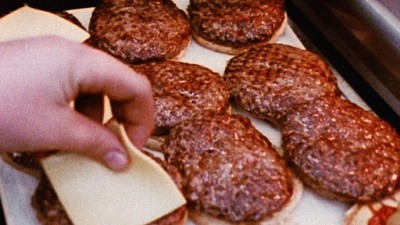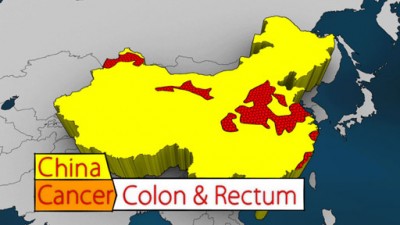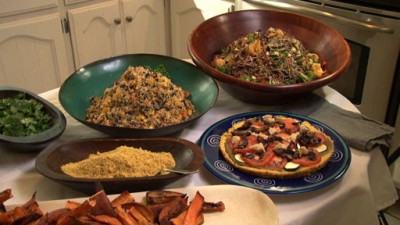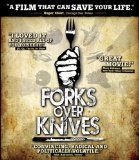| Reviews & Columns |
|
Reviews DVD TV on DVD Blu-ray 4K UHD International DVDs In Theaters Reviews by Studio Video Games Features Collector Series DVDs Easter Egg Database Interviews DVD Talk Radio Feature Articles Columns Anime Talk DVD Savant Horror DVDs The M.O.D. Squad Art House HD Talk Silent DVD
|
DVD Talk Forum |
|
|
| Resources |
|
DVD Price Search Customer Service #'s RCE Info Links |
|
Columns
|
|
|
Forks Over Knives

Please Note: The images used here are promotional stills not taken from the Blu-ray edition under review.
If you have already seen or read Fast Food Nation, Super-Size Me, or Food, Inc., you may not need to see Lee Fulkerson's Forks Over Knives, the latest in that string of convincing documents informing us, in no uncertain terms and with a ton of conclusive evidence, that the gluttonous, animal protein-based, processed food-saturated typical Western diet is the obvious and direct cause of deadly obesity, heart disease, cancer, and a host of other preventable diseases. You may still want to do yourself the favor of giving it a look-see, though; it has its own highly informative, well-organized, and sometimes compelling way of reintroducing you to what you may already know, and if knowledge is power, a solid reminder like Forks Over Knives can be what keeps the knowledge fresh and the power ready at hand.
Fulkerson knows that trying to involve and enlighten us rather than just scolding us for the Coke and ice cream we'd have to be superhuman not to love is the preferable method of delivering the bad news that those fries are definitely going to make you fat and tired, and probably going to lead to serious terminal illnesses. He therefore softens the blow by conveying the message through documentation of several interesting and diverse personal experiences that nicely complement the fairly grim biological and nutritional facts he has to share. These experiences, varied as they are, all have one thing in common: each involves an individual who always accepted or just uncritically went along with the meat, dairy, and sugar-heavy American diet until something happened to them that made them stop and reconsider one of the things--what we should and should not eat--that is easiest to take for granted and not really think about. The film's two main "characters" are physicians/professors, Dr. T. Colin Campbell and Dr. Caldwell Esselstyn, who have been doctors and researchers for decades and are bona fide experts whose extensive treatment and study of nutrition, health, and illness led them from the traditional medication-and-surgery-based approach that kicks in after one already has diabetes or cancer, to advocating for the prevention and reversibility of such ailments by "treating" patients with a whole-food, plant-based diet that excludes all processed or animal-based foods. (The scary word "veganism" is barely mentioned, but it is what the good doctors are propounding.) Both Campbell and Esselstyn grew up on farms whose very existence and viability depended upon the idea that milk and roast beef are the foundation of a sensible diet, and they work in a field where surgery is glamorized as treatment and rejecting meat is considered "radical," so their transformation in thinking was not based on any hippie-liberal platitudes or assumptions, but in long years of hard-facts research and clinical experience that opened their firmly closed eyes; the insights of these genuinely wise old men are thus hard-earned and worth absorbing.

Fulkerson also documents the same change in dietary ideas and habits as it occurs in the lives of some civilian individuals, whether success stories like healthy senior citizens Evelyn Oswick and Anthony Yen, whose death's-door experiences prompted the dietary switch that in both of their cases reversed what were considered terminal heart diseases; or the on-the-way-to-success stories like those of middle-aged, artery-clogged Floridian Joey Aucoin or suburban Cleveland mother San'Dera Nation (not to mention Fulkerson himself, whose scary cholesterol levels and chronic fatigue prompted him to make the changes, too), all of whose crisis-level degree of poor health, lethargy, and dependence on medication to stay alive have more or less forced them to take what they eat with a seriousness that, the filmmakers and the experts involved are convinced, could actually save most of our lives were we to begin the same evolution in thought processes and dietary practices.

The case is made with ease, not least because Fulkerson is an assured documentarian who, if he does not do much that is cinematically innovative or off the beaten documentary path, employs the standard-issue battery of techniques--voice-over narration, filmed interviews, direct documentation, animated graphics--with enough skill to make Forks Over Knives a cogent, coherent, well-structured, and engaging film that blends its complement of hard science and personal testimony in a very convincing way. The film's most significant limitation, however, is an overall lack of conflict that can make it feel more like a PSA or a pamphlet--not because it is simplistic or negatively propagandistic, but because it is so on-message in its every mode--than a film we really need to watch from beginning to end. Fulkerson gives 95% of the film over to building an airtight case with enough defensible, verifiable information and exemplary personal results that the obligatory, perfunctory inclusion of the opposing view--two respectful but tiny snippets of some dairy council spokesperson spouting conventional wisdom that the rest of the film shows up as mindless error--seems almost disingenuous. The film is educational and has a relatable human element, but it is just not (and perhaps could not be) very dramatic, and its relentlessly positive, can-do tone can become a bit Pollyanna-ish and dull. Is it really that easy to change our most ingrained, personal habits, wrapped up as they are in all the cultural and political influences that the film dutifully acknowledges but then brushes past without having really confronted them?
Forks Over Knives may short-change us a bit with its smiley-faced determination and its minimalizing of the inevitable obstacles and complications of putting into practice the sage advice it has to offer. Still, it is provocative and well-done enough to be worth a glance and some honest consideration. If it has too much of a "good-for-you" aura to be anything much, cinematically speaking, it has its own real-life, relevant, utilitarian urgency that makes it required viewing in a more literal sense than the one based solely its merits or drawbacks as a movie.

THE BLU-RAY:
The visual dimension of the film appears to be mostly standard-issue, digital-video-shot (at various degrees of technological advancement) documentary, but it all looks as clear and vibrant as possible, with the better-filmed interview portions attaining the pristine vividness possible with the more advanced digital technology. Overall, this is probably a case where the technological sophistication of the format outranks that of the source materials, but there are no visual flaws whatsoever in the anamorphic-widescreen, MPEG-2 transfer.
Sound:Again, some of the sound limitations are innate in the recorded-on-the-fly source materials. There are variations in sound quality, with some fuzziness to some of the interviews, but nothing could be considered poorly recorded, and all sound is represented in the Dolby Digital 5.1 surround mix with a fullness and clearness that easily brings it up to the quality standards reasonable for documentary filmmaking.
Extras:The only extras the disc has to offer are six two-minute clips, each dedicated specifically to one issue raised in the film ("What About Organic Meat and Dairy?" and "Tax Dollars for Dairy," etc.), that contain further interviews with some of the film's experts and seem more like trailers or mini-commercials for the film and its accompanying website than anything that really supplements or deepens what we have already seen in the feature.
FINAL THOUGHTS:Forks Over Knives (whose title cleverly tells us what, in the film's view, is the preferred choice when it comes to treating diet-related, epidemic diseases in prosperous nations) is far from the first documentary to take a critical look at our dietary behaviors and their serious implications for our health. It is, however, an informative and engaging enough entry in the growing body of conscientious, good-advice documentary cinema that, while somewhat short on the nitty-gritty, how-to aspects of actually implementing the drastic lifestyle changes it cheerfully and convincingly proposes, is of enough informational and inspirational interest to be Recommended.
|
| Popular Reviews |
| Sponsored Links |
|
|
| Sponsored Links |
|
|
| Release List | Reviews | Shop | Newsletter | Forum | DVD Giveaways | Blu-Ray | Advertise |
|
Copyright 2024 DVDTalk.com All Rights Reserved. Legal Info, Privacy Policy, Terms of Use,
Manage Preferences,
Your Privacy Choices | |||||||















